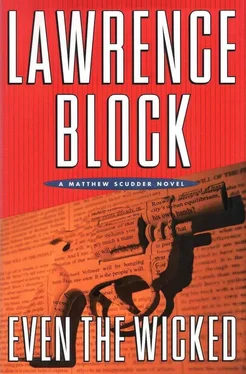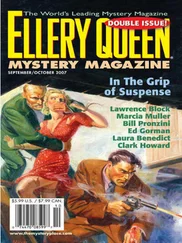“Pretty soon he won’t even have to write letters,” Denis Hamill concluded. “He’ll just think his powerful thoughts in private, and the bad guys’ll be dropping like flies.”
Funny, I thought, that we hadn’t heard from him.
Tuesday morning I was up before Elaine, and I had breakfast on the table when she got out of the shower. “Great cantaloupe,” she pronounced. “Much better than yesterday.”
“It’s the other half of the one we had yesterday,” I said.
“Oh,” she said. “I guess it’s the preparation.”
“I put it on a plate,” I said, “and I set it in front of you.”
“Yes, that’s just what you did, you old bear. And nobody could have done it better, either.”
“It’s all in the wrist.”
“Must be.”
“Combined with a sort of Zen approach,” I said. “I was concentrating on something else while I just let breakfast happen.”
“Concentrating on what?”
“On a dream I can’t remember.”
“You hardly ever remember your dreams.”
“I know,” I said, “but I woke up with the feeling that there was something this dream was trying to tell me, and it seemed to me it was a dream I’d had before. In fact—”
“Yes?”
“Well, I have the sense of having been dreaming this dream a lot lately.”
“The same dream.”
“I think so.”
“Which you can’t remember.”
“It had a familiarity to it,” I said, “as if I’d been there before. I don’t know if it’s the same dream each time, but I think I keep dreaming about the same person each time. He’s right there, and he’s looking very earnest and trying to tell me some thing, and I wake up and he’s gone.”
“Like a puff of smoke.”
“Sort of.”
“Like your lap when you stand up.”
“Well...”
“Who is he?”
“That’s the problem,” I said. “I don’t remember who he is, and no matter how much I try to remember—”
“Quit trying.”
“Huh?”
She rose, moved to stand behind me. She smoothed my hair back with the tips of her fingers. “There’s nothing to remember,” she said. “Just ease up. So don’t try to remember. Just answer the question. Who’d you dream about?”
“I don’t know.”
“That’s okay. Imagine Adrian Whitfield.”
“It wasn’t Adrian Whitfield.”
“Of course it wasn’t. Imagine him anyway.”
“All right.”
“Now imagine Vollman.”
“Who?”
“The one who killed those kids.”
“Vollmer.”
“Fine, Vollmer. Imagine him.”
“It wasn’t—”
“I know it wasn’t. Humor me, okay? Imagine him.”
“All right.”
“Now imagine Ray Gruliow.”
“I didn’t dream about Ray,” I said, “and this isn’t going to work. I appreciate what you’re trying to do—”
“I know you do.”
“But it’s not going to work.”
“I know. Can I ask you a couple of questions?”
“I suppose so.”
“What’s your name?”
“Matthew Scudder.”
“What’s your wife’s name?”
“Elaine Mardell. Elaine Mardell Scudder.”
“Do you love her?”
“Do you have to ask?”
“Just answer the question. Do you love her?”
“Yes.”
“Who’d you dream about?”
“Nice try, but it’s not going to...”
“Yes?”
“I’ll be a son of a bitch.”
“So? Are you going to tell me?”
“Pleased with yourself, aren’t you?”
“Pleased beyond measure, and — now stop that!”
“I just want to touch it for a minute.”
“Say the name, will you? Before it slips your mind again.”
“It won’t,” I said. “Now why in the hell would I dream about him?”
“Fine, keep me in suspense.”
“Glenn Holtzmann,” I said. “How did you do that?”
“Ve haff vays of making you remember.”
“So it would seem. Glenn Holtzmann. Why Glenn Holtzmann, for Christ’s sake?”
I was no closer to the answer an hour later when I went downstairs for the papers. Then I forgot Glenn Holtzmann for the time being.
There had been another letter from Will.
“An Open Letter to the People of New York.”
That’s how Will headed it. He had addressed and mailed it, like all the others, to Marty McGraw at the Daily News, and they were the ones with the story. They gave it the front-page headline and led with it, under McGraw’s byline. His column, “Since You Asked...” ran as a sidebar, and the full text of Will’s letter appeared on the page opposite. It was a long letter for Will, running to just under eight hundred words, which made it just about the same length as McGraw’s column.
He started out by claiming credit (or assuming responsibility) for the murder of Adrian Whitfield. His tone was boastful; he talked at first about the elaborate security set up to protect Whitfield, the burglar alarm, the three shifts of bodyguards, the armor-plated limousine with the bulletproof glass. “But no man can prevail against the Will of the People,” he proclaimed. “No man can run from it. No man can hide from it. Consider Roswell Berry, who fled to Omaha. Consider Julian Rashid, behind his fortified walls in St. Albans. The Will of the People can reach across vast space, it can slip through the stoutest defenses. No man can resist it.”
Whitfield, Will went on, was by no means the worst lawyer in the world. It had simply been his lot to serve as representative of an ineradicable evil in the legal profession, an apparent willingness to do anything, however abhorrent and immoral, in the service of a client. “We nod in approval when an attorney defends the indefensible, and even tolerate behavior in a client’s interest which would earn the lawyer a horsewhipping were he so to act on his own behalf.”
Then Will launched into an evaluation of the legal system, questioning the value of the jury system. There was nothing startlingly original about any of the points he raised, though he argued them reasonably enough so that you found yourself ready to forget you were reading the words of a serial murderer.
He ended on a personal note. “I find I’m tired of killing. I am grateful to have been the instrument selected to perform these several acts of social surgery. But there is a heavy toll taken on him who is called upon to do evil in the service of a greater good. I’ll rest now, until the day comes when I’m once again called to act.”
I had a question, and I made half a dozen phone calls trying to get an answer. Eventually I got around to calling the News. I gave my name to the woman who answered and said I’d like to talk to Marty McGraw. She took my number, and within ten minutes the phone rang.
“Marty McGraw,” he said. “Matthew Scudder, you’re the detective Whitfield hired, right? I think we might have met once.”
“Years ago.”
“Most of my life is years ago. What have you got for me?”
“A question. Did the letter run verbatim?”
“Absolutely. Why?”
“No cuts at all? Nothing held back at the cops’ request?”
“Now how could I tell you that?” He sounded aggrieved. “For all I know, you could be Will yourself.”
“You’re absolutely right,” I said. “On the other hand, if I were Will, I’d probably know whether or not you cut my copy.”
“Jesus,” he said, “I’d hate to be the one to do something like that. I know how I get when that mutt at the big desk cuts my copy, and I’m not a homicidal maniac.”
“Well, neither am I. Look, here’s what I’m getting at. As far as I can tell, there’s nothing in the letter to disprove the suicide theory.”
“There’s Will’s word on the subject. He says he did it.”
Читать дальше












